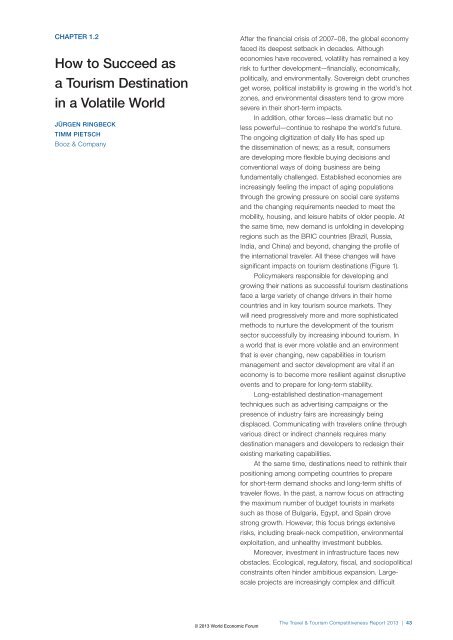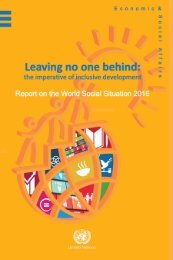The Travel & Tourism Competitiveness Report 2013
The Travel & Tourism Competitiveness Report 2013
The Travel & Tourism Competitiveness Report 2013
Create successful ePaper yourself
Turn your PDF publications into a flip-book with our unique Google optimized e-Paper software.
CHAPTER 1.2<br />
How to Succeed as<br />
a <strong>Tourism</strong> Destination<br />
in a Volatile World<br />
JÜRGEN RINGBECK<br />
TIMM PIETSCH<br />
Booz & Company<br />
© <strong>2013</strong> World Economic Forum<br />
After the financial crisis of 2007–08, the global economy<br />
faced its deepest setback in decades. Although<br />
economies have recovered, volatility has remained a key<br />
risk to further development—financially, economically,<br />
politically, and environmentally. Sovereign debt crunches<br />
get worse, political instability is growing in the world’s hot<br />
zones, and environmental disasters tend to grow more<br />
severe in their short-term impacts.<br />
In addition, other forces—less dramatic but no<br />
less powerful—continue to reshape the world’s future.<br />
<strong>The</strong> ongoing digitization of daily life has sped up<br />
the dissemination of news; as a result, consumers<br />
are developing more flexible buying decisions and<br />
conventional ways of doing business are being<br />
fundamentally challenged. Established economies are<br />
increasingly feeling the impact of aging populations<br />
through the growing pressure on social care systems<br />
and the changing requirements needed to meet the<br />
mobility, housing, and leisure habits of older people. At<br />
the same time, new demand is unfolding in developing<br />
regions such as the BRIC countries (Brazil, Russia,<br />
India, and China) and beyond, changing the profile of<br />
the international traveler. All these changes will have<br />
significant impacts on tourism destinations (Figure 1).<br />
Policymakers responsible for developing and<br />
growing their nations as successful tourism destinations<br />
face a large variety of change drivers in their home<br />
countries and in key tourism source markets. <strong>The</strong>y<br />
will need progressively more and more sophisticated<br />
methods to nurture the development of the tourism<br />
sector successfully by increasing inbound tourism. In<br />
a world that is ever more volatile and an environment<br />
that is ever changing, new capabilities in tourism<br />
management and sector development are vital if an<br />
economy is to become more resilient against disruptive<br />
events and to prepare for long-term stability.<br />
Long-established destination-management<br />
techniques such as advertising campaigns or the<br />
presence of industry fairs are increasingly being<br />
displaced. Communicating with travelers online through<br />
various direct or indirect channels requires many<br />
destination managers and developers to redesign their<br />
existing marketing capabilities.<br />
At the same time, destinations need to rethink their<br />
positioning among competing countries to prepare<br />
for short-term demand shocks and long-term shifts of<br />
traveler flows. In the past, a narrow focus on attracting<br />
the maximum number of budget tourists in markets<br />
such as those of Bulgaria, Egypt, and Spain drove<br />
strong growth. However, this focus brings extensive<br />
risks, including break-neck competition, environmental<br />
exploitation, and unhealthy investment bubbles.<br />
Moreover, investment in infrastructure faces new<br />
obstacles. Ecological, regulatory, fiscal, and sociopolitical<br />
constraints often hinder ambitious expansion. Largescale<br />
projects are increasingly complex and difficult<br />
<strong>The</strong> <strong>Travel</strong> & <strong>Tourism</strong> <strong>Competitiveness</strong> <strong>Report</strong> <strong>2013</strong> | 43

















